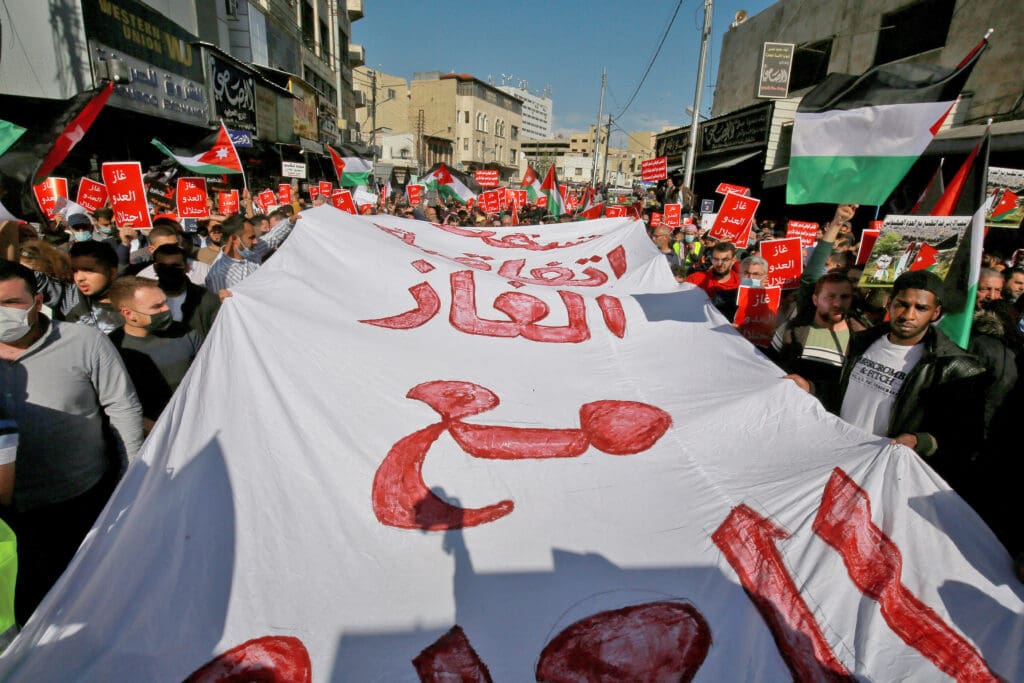Israel’s war in Gaza has presented Jordan with a pressing conundrum. The resource-starved kingdom’s lack of fossil fuels has long forced it to rely heavily on energy imports, largely from the Gulf—but also from its neighbor, Israel. Yet the Jordanian public, particularly its large Palestinian population, is outraged by Israel’s ongoing military actions in Gaza. As Israel mulls the possibility of annexing the West Bank, which also borders Jordan, domestic pressure is growing on Amman to cancel a long-term, $10 billion gas deal with its neighbor. All this is prompting the kingdom to explore new energy options that are politically palatable, sustainable, and will not compromise its long-term economic health. Green hydrogen is high on the kingdom’s priority list.
Enter China. Last month, Jordanian officials signed a preliminary deal with China’s UEG Green Hydrogen Development Holding Limited to prepare a feasibility study for a $1.15 billion green hydrogen production project in Jordan, in line with the kingdom’s National Green Hydrogen Strategy. Coming just a year after Amman lost an arbitration claim against a major Chinese-led oil shale venture over high tariffs, the deal underscores its willingness to re-engage with Beijing on energy—and for Beijing to engage back.
Jordan’s Energy Woes
Domestic sensitivity over buying energy from Israel is not new. A 15-year gas purchase deal signed in 2014 sparked a severe public backlash that spilled into the streets of Amman. Protests erupted in 2016 and again in 2020 over the deal, with opposition parties, unions, and segments of parliament denouncing it as a threat to Jordanian sovereignty. That political sensitivity has made energy independence—particularly in renewables—a major national priority, as Jordan seeks to reduce its long-term dependence on fossil fuels from other regional suppliers and mitigate its vulnerability to sudden shifts in the regional security landscape. Those risks are not hypothetical. In August, Egypt signed a $35 billion deal with Israel to supply the country with natural gas, prompting public criticism. One month later, Israel’s Prime Minister Benjamin Netanyahu threatened to cancel the deal in a tit for tat with Egypt over border security disputes in the Sinai.
Building a more robust local supply has helped Jordan gradually improve its local power sources and shift away from imported gas toward renewable energy sources. By 2024, the kingdom had reduced the share of natural gas in its electricity generation mix to 58 percent and was becoming more creative in its energy investments, targeting solar and wind, as well as shale oil. This has made Jordan a regional leader in renewables; solar and wind account for roughly 30 percent of its electricity output, and the kingdom aims to push that to half of the total.
Beyond renewables, Jordan has been able to localize a growing share of its energy generation through oil shale, but this has come with political costs. The fuel, long dismissed as too dirty and too costly, now supplies 15 percent of its electricity, up from 12.6 percent in 2023 and beating Jordan’s 2025 goal of 10 percent.
China, too, has played a controversial role in Jordan’s energy sector. The driver of oil shale’s growth is the Attarat power plant, a $2.1 billion Chinese-financed project that has been central to Jordan’s domestic energy production, but which has also loaded the country with debt. Under the power purchase agreement between Amman and the Chinese-led Attarat Power Company (APCO), Jordan was obligated to pay billions of dollars over the project’s lifetime, locking it into some of the region’s most expensive tariffs, at $0.17 per kilowatt-hour. This was estimated to increase consumer energy costs by 17 percent, costing Jordan nearly $280 million annually. Amman took the dispute to arbitration, arguing the contract was unsustainable. It ultimately lost in 2024, and paid an additional $13 million in legal fees.
The Attarat plant is still operational, and despite political and economic challenges, it has helped Jordan achieve its energy diversity goals and mitigate energy insecurity resulting from regional periods of escalation. The grid, too, is growing. Some Jordanians see cooperation with China as critical for Jordan’s electricity future. Chinese observers view energy as a long-term issue in Sino-Jordanian relations and blame the U.S. for promoting a “debt trap” narrative surrounding the Attarat plant.
Re-engaging China
The Attarat experience does not seem to have deterred Jordan from exploring new energy projects with China as it pushes toward greater energy diversity, independence, and export capacity. The plan agreed to in September involves using renewable energy and desalinated seawater to produce around 200,000 tons per year of green ammonia—a liquid form of hydrogen that is easier to store and transport than hydrogen gas—with production aimed to replace heavier fuels used in Jordan’s key industries, as well as export to European and Asian markets. The agreement begins with a feasibility study to assess land allocation, water resources, cost estimates, and technical design.
The viability of the green hydrogen partnership will depend on whether Jordan’s other infrastructure ambitions come online in parallel. This will test Jordan’s ability to align its water, energy, and export strategies into a coherent system. Large-scale hydrogen and ammonia production is resource-intensive, and will require Jordan to have access to reliable supplies of desalinated water, expanded renewables capacity, and upgraded grid infrastructure. Jordan is a water-scarce country, and much will depend on its flagship Aqaba–Amman desalination and conveyance project, which is being developed to provide a steady supply of fresh water. This initiative will also be crucial in providing sufficient supplies to facilitate electrolysis and meet the project’s production goals.
Jordan’s next steps on hydrogen will require a sharper, more transparent approach than the one it took to the Attarat deal. Its challenges over oil shale have shown how opaque negotiations and poorly balanced risk-sharing can leave the government locked into punitive tariffs that weaken public confidence. Repeating that mistake with hydrogen would not only weigh down the economy further but also risk straining relations with China, the leading external economic power in the region. Greater openness at every stage, from feasibility assessments to contract design, would both help protect Jordan’s fiscal position and demonstrate to other investors that the kingdom is a credible, rules-based destination for clean energy. Done right, however, the hydrogen project could be the case study that proves Jordan has learned from Attarat and is ready to offer a more stable investment climate.
If these pieces do not fall into place, Jordan risks repeating the pattern of ambitious agreements that falter at the execution stage. While China has been an effective energy partner for Gulf states, Amman’s green hydrogen deal with Beijing must be managed differently from its last experience, especially if it moves beyond a feasibility study. The Attarat oil shale project continues to feed the grid, but at a debilitating financial cost. Both sides will need to craft a more balanced framework for risk management, contract design and dispute resolution if this new partnership is to avoid similar pitfalls. There are other means for resolving potential disputes, such as the Hong Kong-based International Organization for Mediation (IOMED), which enables states to pursue non-legally binding mediation. However, a better-structured agreement at the outset would position Jordan for success throughout the process.
Looking forward
By re-engaging with Beijing, Jordan has signaled that it will not close the door to partners willing to finance its energy transition. However, each side needs a clear understanding of the other’s red lines. For Amman, economic stability is inseparable from political stability, and reliance on Israeli gas contracts has already fueled deep domestic frustration. If China is willing to step in, as it did with Attarat, it must be prepared to navigate Jordan’s complex domestic landscape. For its part, Jordan must show it can offer transparency, credible safeguards, and predictable returns that reassure investors and prevent a repeat of the Attarat debacle.
Both sides could also cushion their mutual concerns by triangulating their investments with Gulf Cooperation Council (GCC) countries, such as the United Arab Emirates or Saudi Arabia, and providing a role for a third-party investor that both trust. However, the partnership will only succeed if Beijing accepts the political sensitivities that shape Jordan’s choices, while Amman demonstrates that it can provide a stable, rules-based environment for clean energy investment.


